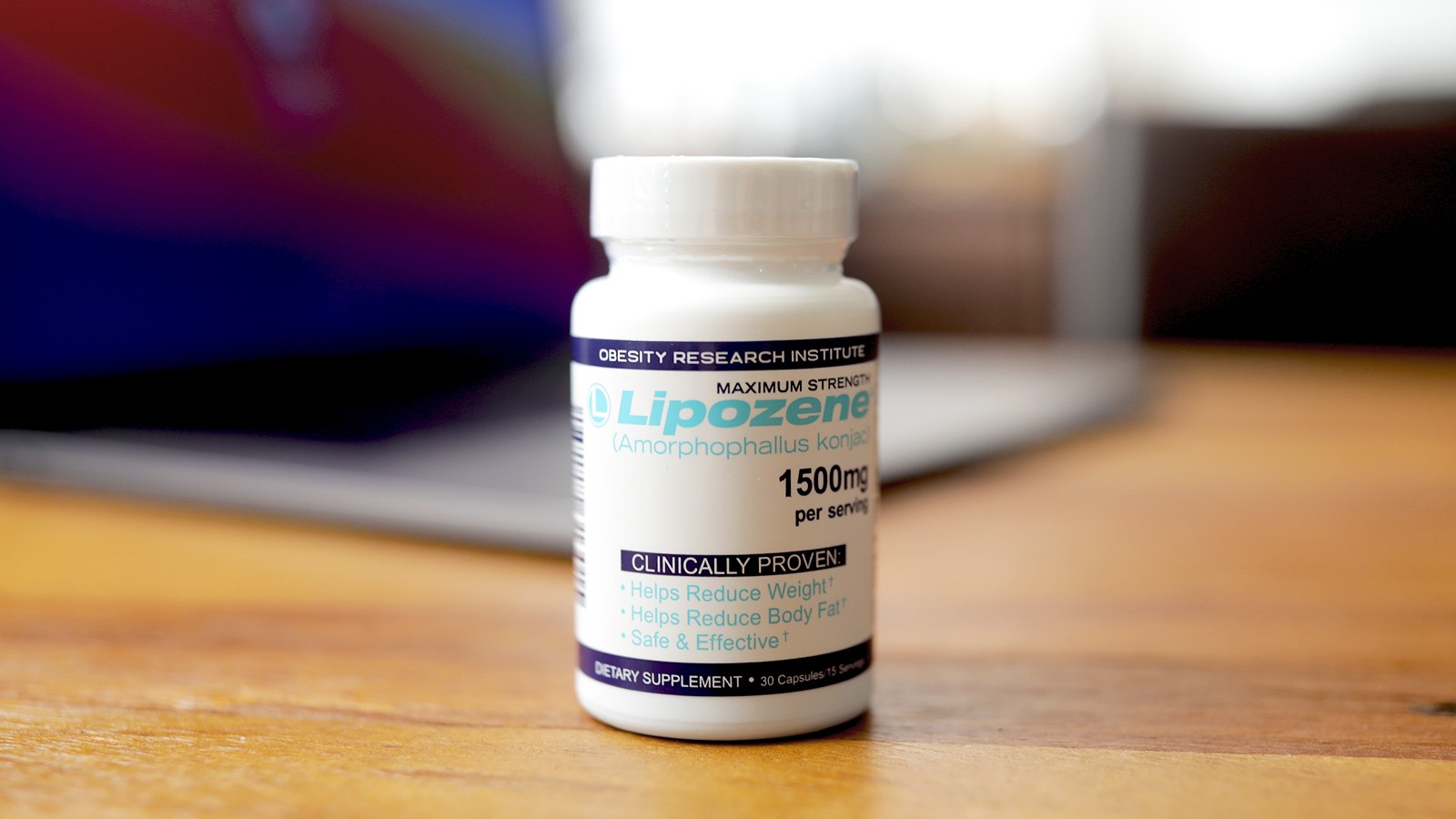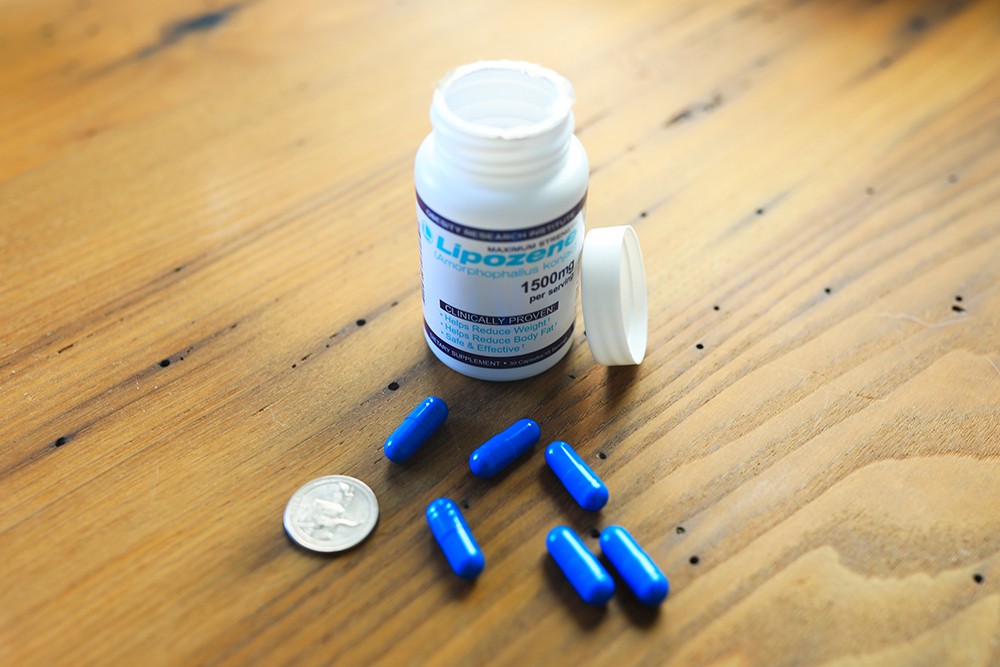WellnessVerge is reader-supported. We may earn a commission when you make a purchase through the links on this page. Learn more about our process here.
Lipozene Review: A Critical Look at This Weight Loss Supplement
Last Updated on February 17, 2024
Dietitian Reviewed Kelsey Costa, MS, RDN
This review analyzes Lipozene's weight loss claims and the research behind its glucomannan fiber ingredient. Get an honest look at effectiveness, side effects, better alternatives, and expert guidance on whether it's worth trying.


Key Highlights
- Lipozene's sole active ingredient is glucomannan, a soluble fiber that may aid short-term weight loss by promoting fullness and potentially reducing calorie absorption.
- The manufacturer's claims of significant weight loss lack robust clinical evidence and peer-reviewed studies.
- Existing research on glucomannan supplements shows mixed results, with some studies supporting modest weight loss and others finding no significant effects.
- Potential side effects include gastrointestinal issues like gas, diarrhea, and abdominal discomfort, which are common with fiber supplements.
- Lipozene is substantially more expensive compared to similar glucomannan supplement alternatives.
Lipozene Overview
Lipozene is a popular weight loss pill containing glucomannan that promises to help people lose weight without having to change their eating habits or lifestyle.
Manufactured by the Obesity Research Institute, a California-based company founded in 2003, this supplement is one of many weight loss products they have developed.
The proprietary blend used in Lipozene is from the root of the konjac plant, Amorphophallus konjac, also called elephant yam. It contains a water-soluble fiber called glucomannan.(1)
This fiber is considered water-soluble or “viscous” because it has an amazing ability to absorb water. A small amount of glucomannan can turn an 8-ounce (250 ml) glass of water into a gel. Therefore, ingesting glucomannan with water creates a thick, gel-like substance in your stomach.
This slows the emptying of food from the stomach, increasing digestion time and, therefore, helping you to feel full for longer after eating.
The manufacturer recommends taking 2 Lipozene pills 30 minutes before each meal, at a maximum of 6 pills per day. Every serving of Lipozene should be taken with at least 8 ounces (250ml) of water.
|
Pros
|
Cons
|
How Lipozene May Promote Weight Loss
Based on many research studies, fiber intake is linked to lower body weight. (2)
Considering the nature of glucomannan as a soluble fiber, Lipozene may promote weight loss in the following ways:
- Keeping You Feeling Full for Longer: Due to its water-absorbing properties, glucomannan attracts water and expands in the stomach, forming a gel. This process will slow the digestion rate, helping you feel fuller after eating, which may reduce your appetite and prevent overeating.
- Reducing Your Dietary Calorie Intake: Glucomannan may decrease the absorption of other calorie-containing nutrients, such as protein and fat. This could mean that fewer calories are being absorbed by your body from the food you eat after taking Lipozene.
- Promoting Gut Health: Increasing your fiber intake promotes good bacteria (microbiome) in the gut. Enhancing your gut microbiome may lead to weight loss. According to a recent research review, changing the gut microbiome may be an important tool in the treatment of obesity and lead to reductions in BMI, body weight, and fat mass. (3)
Mixed Research Results for Lipozene’s Key Ingredient
Ultimately, some research on using glucomannan is promising for short-term weight loss. In contrast, other research shows that this fiber supplement does not promote weight loss or a change in body composition in the long term.
A recent meta-analysis, including 6 study trials, found a significant reduction in body weight following glucomannan supplementation in 225 overweight and obese adults. (4)
On the other hand, a peer-reviewed study from the Journal of Obesity found that glucomannan supplements administered over 8 weeks did not promote weight loss or significantly affect body composition, hunger, or fullness. (5)
Another study concluded that glucomannan did promote limited weight loss. Still, researchers found no change in the participants’ long-term body mass index (BMI). (6)
Lipozene's Clinical Trial Claims
The manufacturers of Lipozene claim to have completed clinical studies that showed great success in using the supplement for weight loss.
The website states that all the participants in their first study lost an average of 4.93 more pounds than the placebo, with 78% of each pound lost being pure body fat.
As remarkable as these numbers may sound, the Lipozene study is limited in several ways. No details are provided to the general public on how body fat was measured or information on the participants’ calorie intakes and exercise regimens.
More problematic than this is the lack of available information, as this study was never peer-reviewed. Peer-reviewed studies meet certain scientific quality standards and are considered a trusted form of scientific communication.

Safety and Side Effects
Taking Lipozene may cause some gastrointestinal side effects. Its active ingredient, glucomannan, is generally recognized as safe. Additionally, the supplement’s inactive ingredients are generally recognized as safe or likely safe in small amounts.
According to the National Institutes of Health (NIH), the side effects of taking glucomannan may include loose stools, gas, diarrhea, constipation, and abdominal discomfort. (7)
Each Lipozene pill contains 0.75 grams of glucomannan, so taking 2 pills provides 1.5 grams of glucomannan. If you take 6 pills per day, this is equivalent to taking 4.5 grams of glucomannan, which exceeds the amount that has been shown to be effective for weight loss. (8)
Therefore, taking more than 4 grams of glucomannan may not be tolerated well by some people, possibly leading to gastrointestinal side effects.
Additionally, glucomannan also has the potential to lower blood sugar, which may benefit some people. However, patients who are receiving insulin or drugs for blood sugar management should speak with their doctor before using this product.
It may also reduce the absorption of other oral medications, so it is advised to take medications either 1 hour before or 4 hours after taking glucomannan. (9)
It is important to talk to your healthcare provider before taking Lipozene or any other supplement to ensure it is safe.
Inactive Ingredient Considerations
As previously mentioned, there is only one active ingredient in Lipozene—glucomannan. However, some may want to consider the inactive ingredients when choosing a fiber supplement.
Lipozene’s inactive ingredients include:
- Gelatin
- Microcrystalline Cellulose
- Magnesium Silicate
- Stearic Acid
- Titanium Dioxide
- FD&C Blue #1
These ingredients provide no potential weight loss benefits.
Gelatin is used to add bulk to the product. This ingredient is animal-derived, so vegans and vegetarians will want to find a different fiber supplement. Due to some concerns about the safety of gelatin, you should avoid taking gelatin in large amounts. However, gelatin is considered likely safe for most people in small amounts. (10)
Microcrystalline cellulose, magnesium silicate, and stearic acid are common food additives that act as anti-caking agents and fillers. This means they are added to prevent the glucomannan powder from becoming clumpy and fill extra space inside the pill capsule.
These additives are generally recognized as safe to consume. However, too much microcrystalline cellulose can cause gastrointestinal side effects similar to glucomannan.
Titanium dioxide is a chemical compound used as a food coloring agent, often added to pills to make them white. It is approved by the U.S. Food and Drug Administration (FDA) for use in food, but its safety as a food additive has recently been under question. In fact, the European Food Safety Authority (EFSA) no longer considers titanium dioxide as safe when used as a food additive.
However, titanium dioxide may be present in over 90% of all oral form medications and supplements at this time, so it may be more difficult to find products without it.
FD&C Blue #1, also known as Brilliant Blue FCF, is an artificial blue dye added to many processed foods, medications, and supplements. Although widely used, FD&C Blue #1 has been known to cause dangerous allergic reactions in some people. There is no conclusive evidence for those who are not allergic that this food dye is unsafe for general food use.
Frequently Asked Questions
How do I take Lipozene?
As a dietary supplement, take 2 capsules 30 minutes before meals, up to three times per day, with at least 8 ounces (250 ml) of water.
What are the dangers of taking Lipozene?
Lipozene is a fiber supplement. The most common side effects from taking glucomannan fiber supplements are gastrointestinal symptoms including diarrhea, gas, constipation, and abdominal discomfort.
How much weight can I lose and how long before I’ll see results from taking Lipozene?
Weight loss results with Lipozene use will vary from person to person.
The extent of your weight loss will depend on various factors, including the number of calories you eat, the amount of exercise you get, and if you have any underlying health conditions.
One scientific review found that people taking Lipozene lost between 0.5 and 1.7 pounds after taking glucomannan for just over five weeks.
It is best to wait at least 4–6 weeks before expecting to see results from taking Lipozene.
Can I take Lipozene with medications?
The manufacturer does not specify any drug or supplement interactions. However, it is best to speak with your doctor before taking any supplements, including Lipozene.
Cost and Where to Buy
When purchased directly from the manufacturer, as an introductory buy-one-get-one-free offer, two bottles of 30 capsules each (60 capsules total) is $29.95, which includes free shipping and handling.
Lipozene offers a 30-day money-back guarantee.
Your total monthly cost of Lipozene depends on how much you take. Based on Lipozene’s recommended dosage (2 capsules, up to three times per day), a one-month supply would cost roughly $90.
Lipozene is available from the following popular retailers at a lower price:
- Amazon: $32.95 (120 Capsules)
- Walmart: $32.95 (120 Capsules)
- Walgreens: $20.99 (60 Capsules)
Popular Alternatives
Ninety dollars per month for Lipozene is very steep compared to other supplements and diet pills for weight loss with the same active ingredient. A wide variety of glucomannan supplements are available at most stores and online retailers for a fraction of the cost of Lipozene.
Here’s how Lipozene compares to several glucomannan supplements from well-established brands that we believe are better alternatives:
|
Lipozene |
Swanson Premium Glucomannan |
NOW Foods Glucomannan |
NutriGold Glucomannan GOLD |
|
|---|---|---|---|---|
|
Amount of Gluconaman per Serving |
1,500 mg |
1,330 mg |
1,725 mg |
1,400 mg |
|
Dosage |
2 capsules before every meal, 6 capsules total |
2 capsules before every meal, 6 capsules total |
3 capsules, two times daily before meals, 6 capsules total |
2 capsules before every meal, 6 capsules total |
|
Artificial Ingredients and Additives |
Yes |
Yes |
Yes |
No |
|
Third-Party Tested |
No |
Yes |
Yes |
Yes |
|
Regular Price |
$32.95 (120 capsules) |
$6.36 (90 capsules) |
$23.99 (180 capsules) |
$16.49 (120 capsules) |
|
Cost per Serving |
$0.55 |
$0.14 |
$0.40 |
$0.27 |
|
Estimated Cost per Month |
$49.50 |
$12.60 |
$24 |
$24.30 |
|
Purchase |
Shop on Amazon | Shop on Swanson | Shop on Amazon | Shop from NutriGold |
Keep in mind that a safe or effective dose of glucomannan has not been established. Research shows that 1.2–15.1 grams per day may be beneficial.
- If you want the highest-quality glucomannan supplement without any additives, NutriGold Glucomannan GOLD is your best option.
- If you want the most budget-friendly option, Swanson Premium Glucomannan is a clear winner.
The Final Word on Lipozene
Taking Lipozene may help you lose some weight and doesn’t appear to have any serious side effects for most people. However, no scientific studies have shown that this product will help you sustain that weight loss long-term.
Also, remember that this supplement contains animal-derived gelatin, so it is unsuitable for vegans or vegetarians.
For long-term success, no dietary supplement can replace healthy weight loss habits. However, if you’re looking to try a fiber supplement to assist you in your weight loss efforts in the short term, there are less expensive glucomannan supplements that will provide results that are comparable to this product.
A Dietitian’s Nutritional Advice
Since taking fiber supplements alone has not been shown to help shed substantial extra weight, you may want to consider lifestyle changes to aid your weight loss efforts.
Even though you may not see immediate results, eating a healthy, well-balanced diet, reducing calorie intake, and participating in regular physical activity are tried and true weight management methods.
What does a healthy, well-balanced diet look like?
- Start by adding at least a serving (or more) of fruits or vegetables to each meal.
- Limit your intake of highly processed, packaged foods like chips, granola bars, and deli meats.
- Finally, try to include more plant-based foods and less animal-based foods in your diet. If you choose to consume animal products, aim for low-fat dairy, eggs, poultry breast, fish, and lean cuts of unprocessed meat.
At WellnessVerge, we only use reputable sources, including peer-reviewed medical journals and well-respected academic institutions.
- Konjac glucomannan, a promising polysaccharide of Amorphophallus konjac K. Koch in health care:
https://www.sciencedirect.com/science/article/abs/pii/S0141813016310339 - Fiber Intake Predicts Weight Loss and Dietary Adherence in Adults Consuming Calorie-Restricted Diets: The POUNDS Lost (Preventing Overweight Using Novel Dietary Strategies) Study:
https://www.sciencedirect.com/science/article/pii/S0022316622164503 - source:
https://www.ncbi.nlm.nih.gov/pmc/articles/PMC5867888/ - Effects of glucomannan supplementation on weight loss in overweight and obese adults: A systematic review and meta-analysis of randomized controlled trials – ScienceDirect:
https://www.sciencedirect.com/science/article/abs/pii/S2451847620300968 - Safety and Efficacy of Glucomannan for Weight Loss in Overweight and Moderately Obese Adults:
https://www.hindawi.com/journals/jobe/2013/610908/ - The effect of glucomannan on body weight in overweight or obese children and adults: A systematic review of randomized controlled trials:
https://www.sciencedirect.com/science/article/abs/pii/S0899900714004250?via%253Dihub - Dietary Supplements for Weight Loss - Health Professional Fact Sheet:
https://ods.od.nih.gov/factsheets/WeightLoss-HealthProfessional/#glucomannan - Glucomannan and obesity: a critical review - PubMed:
https://pubmed.ncbi.nlm.nih.gov/16320857/ - Glucomannan – Drugs.com:
https://www.drugs.com/npp/glucomannan.html - How safe is gelatin? A systematic review and meta-analysis of gelatin-containing plasma expanders vs crystalloids and albumin - PubMed:
https://pubmed.ncbi.nlm.nih.gov/27481739/





